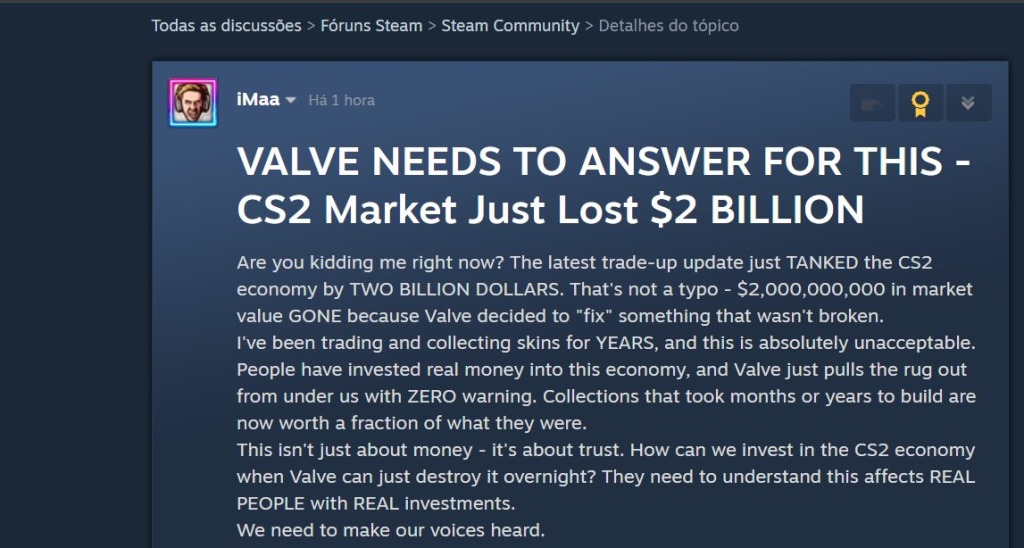Southeast Insights
Your go-to source for news and information from the vibrant heart of Shenyang.
When Skin Trading Ecosystems Go Bust: A Dive Into the virtual Mayhem
Explore the chaotic world of skin trading as we uncover the shocking reasons behind its sudden collapse! Don't miss this deep dive into virtual mayhem.
The Rise and Fall of Skin Trading: Lessons from the Virtual Market
The phenomenon of skin trading in virtual markets, particularly in the gaming industry, has seen a dramatic rise and fall over the years. What began as a unique way for players to express themselves and showcase rare items turned into a bustling economy, with some players even treating skins as real-life assets. However, this boom was not without its pitfalls. The emergence of black market dealings, hacking incidents, and regulatory scrutiny led to a decline in the once vibrant trading scene. As the allure of rare skins faded, so too did the community's engagement, leaving many to wonder what lessons can be learned from this digital marketplace.
One of the key lessons from the rise and fall of skin trading is the importance of regulation and accountability in virtual economies. Developers and platform holders must implement robust anti-fraud measures to protect players and maintain trust within the community. Furthermore, the volatility of these virtual goods serves as a reminder that while digital assets can hold significant value, they are also subject to market fluctuations influenced by factors beyond the players' control. As we look ahead, embracing transparency and ethical practices will be crucial for any future virtual market to thrive.

Counter-Strike is a popular first-person shooter franchise that has captivated gamers around the world. The game emphasizes teamwork, strategy, and precision, which has led to a massive competitive scene. Recently, there has been concern over the market cap crash cs2, affecting players and investors alike.
Understanding the Risks: What Happens When Skin Trading Ecosystems Collapse?
The world of skin trading ecosystems, prevalent in many online games, presents a vibrant marketplace where players buy, sell, and trade virtual items. However, as with any investment, understanding the risks involved is crucial. When these ecosystems collapse, the consequences can be severe. Players often lose significant financial investments, as the value of their in-game assets plummets. This sudden decline can lead to widespread disillusionment among the gaming community, eroding trust in the platforms that host these transactions. Furthermore, the fallout from such a collapse can extend beyond individual losses and lead to a broader economic impact on the gaming industry itself.
Besides financial implications, the collapse of skin trading ecosystems raises critical ethical concerns. The trading of skins, especially those with real-world value, often leads to issues such as fraud and scams. In the wake of a marketplace failure, players may find themselves victims of malicious actors seeking to exploit the chaos. Additionally, regulatory scrutiny could increase as authorities investigate the legitimacy of these transactions. Thus, stakeholders, including game developers, players, and investors, must remain vigilant and proactive in understanding the dynamics of their virtual economies to mitigate potential fallout from such crises.
Are Skin Trading Platforms Sustainable? A Deep Dive into Their Future
The skin trading platforms have gained immense popularity in the gaming community, allowing players to buy, sell, and trade virtual items. However, the sustainability of these platforms is increasingly under scrutiny. As the gaming industry evolves, factors such as regulatory concerns, market volatility, and changing player preferences raise critical questions about the longevity of these platforms. A significant component to consider is the environmental impact of digital trading, as energy-intensive blockchain technologies become integral to transactions.
Moreover, the future of skin trading platforms will likely hinge upon their ability to adapt to these challenges while maintaining user trust. Community feedback and the enactment of clear regulations can play a crucial role in shaping the trajectory of these platforms. If they evolve to provide transparency and security while leveraging innovative technologies, they may carve a sustainable niche in the digital economy. Ultimately, sustainability will not only depend on market demand but also on how closely platforms align with the ethical expectations of their user base.